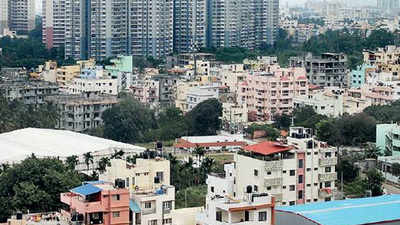The Times of India 04.03.2013
Property tax in Gujarat: Surat cheapest in state
live in the cheapest city when it comes to paying property taxes.
Though the municipal corporation proposed a hike for commercial
properties, nearly 11.5 lakh residential property owners
were spared an increase. User charges for civic utilities have however
doubled for all property owners.
As property tax remains
unaltered for the last four years on area based assessment method, user
charges make a difference as everyone pays these increased charges.
This swells the payment burden by 35 to 40%.
The reason SMC has
been able to keep taxes low is a high recovery rate. Its tax collection
increased by Rs 186 crore in two years – which is a 92% recovery ratio.
Apart from tax recovery, SMC has ushered in second generation financial
reforms.
“According to JnNURM requirements, we have gone ahead
with collection of user charges. We are halfway through with Rs 85
crore in our kitty against our target of Rs 160 crore,” says Sharad
Mehta, deputy commissioner, finance, SMC. In actual fact, JnNURM has
blocked nearly Rs 125 crore of funds allotted to SMC due to non-recovery
of user charges.
With a total budget of Rs 3,713.96 crore for
the year 2013-14, the tax increase of Rs 110 crore is not seen a big
burden, especially as a grant of Rs 556 crore from the state government
is allotted to SMC in lieu of Octroi. (Himansshu Bhatt)
AHMEDABAD
After almost a decade, Ahmedabad Municipal Corporation’s standing
committee accepted the administrative wing’s proposal for a 60% hike in
residential property tax and a 27% increase in commercial property tax.
Beside this, for the first time, AMC
has also started the process of metering water supply – a long standing
demand under the JnNURM scheme, as a part of financial reforms. The
committee has resolved that it will bring out Rs 100 crore worth of
municipal bonds this year.
The residential tax rates in the
property tax formula were raised from Rs 10 per sq m to Rs 16. For
commercial properties, the levy has been hiked by 27% – from Rs 20 per
sq m to Rs 28. The hike will earn an additional Rs 500 crore for AMC.
“We improved our tax recovery and hence avoided any dramatic increase in
tax rates,” says municipal commissioner Guruprasad Mohapatra. In term
of vehicle taxes, the committee has reduced taxes on loading rickshaws
and autorickshaw by 0.25%, while tax for cars worth above Rs 2.99 lakh
remains as it is – between 1.25% and 2.25%. (Paul John)
VADODARA
It was a foregone conclusion that people in Vadodara would have to
loosen their purse strings this year. To start with, the tax rate for
residential properties – the general property tax was raised from Rs 11
to 16 per square metre. While for commercial properties it was raised
from Rs 26 to Rs 30 per sq m.
Apart from the hike in property
taxes, VMC increased water charges, sanitation charges and even imposed a
new streetlight tax. The standing committee made some concessions in
these, but did not shoot them down like in the previous two years. In
fact, it changed the formula for vehicle tax by introducing it as a
percentage of the cost of vehicles instead of a flat rate.
The
civic body will charge streetlight tax at the rate of 8% of general
property tax or Rs 120, whichever is higher. Sanitation charges were
raised from Rs 48 to Rs 100 and for non-residential properties the
minimum charge was hiked from Rs 100 to Rs 240 per annum.
VMC
commissioner Ashwini Kumar had made it evident that the rises
substantial when he presented the budget. Kumar had said that the civic
body will have to raise these to ensure development works. (Sachin Sharma)
RAJKOT
The few cities in the state that have received step-motherly treatment by the state are cities in Saurashtra. Rajkot Municipal Corporation (RMC) has till date not been able to implement the carpet area based tax formula. Despite being led by a BJP board.
The political wing here believes that their property tax will increase
exponentially if the new tax structure comes into place. “Had that been
the reason, none of the other major cities like Ahmedabad and Surat,
which pay comparatively lower property tax than Rajkot, would have
implemented this scheme. Rajkot gets Rs 100 crore in lieu of Octroi and
collects Rs 180 crore as taxes. Since there are no changes in the tax
structure in a posh area people still pay anywhere between Rs 6,000 to
Rs 8,000 for a 1,000 sq ft flat. while it is as much as Rs 26,000 in
commercial areas,” says a senior RMC tax department official.
Junagadh city, despite a low budget, believes in the taxing its citizens
more as it doesn’t have salaries to pay its employees for the last four
months. Jamnagar has proposed the highest increase in residential tax
rates in the state, despite having the least residential properties.
“In Jamnagar the only activity is concentrated around the refinery.
Local business activity is far less. How such cities can pay more
property tax is a problem that state government has to reason out,” says
a senior urban development official. (Vijaysinh Parmar)

